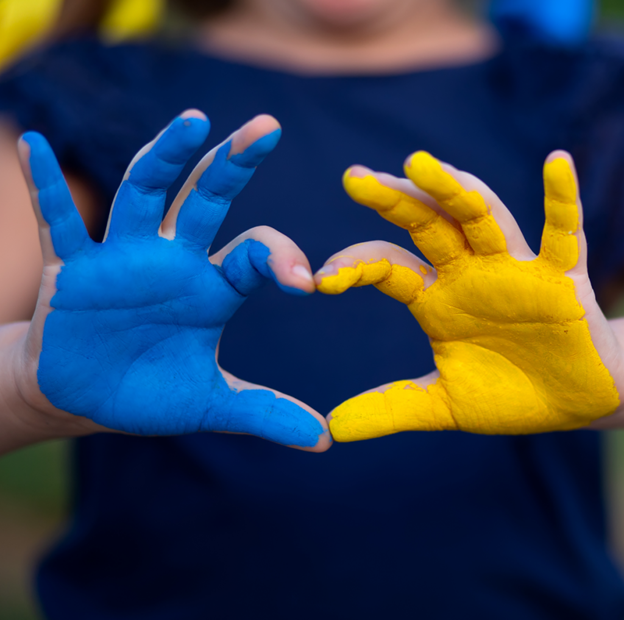MARCH 4, 2022 BY NATHAN R. MONELL, CAE, National PTA “One Voice”
This is part one of the blog series about the Russia-Ukraine War and the effects on children and youth across the country and around the world. You can read part two here.
“What is happening in Ukraine can be frightening for both children and adults. Ignoring or avoiding the topic can lead to children feeling lost, alone and scared, which can affect their health and well-being. It is essential to have open and honest conversations with children to help them process what is happening.”— Ane Lemche, Save the Children
As I write this, Russian troops are accelerating their drive into Ukraine and all of America sits watching the events unfold with a mixture of emotions. We shed a tear with the Ukrainian father whose family cries as he leaves them at the border and heads back to fight. We marvel at the resistance of a strong people who are heroic in their resistance. We dread what it may cost them. We see a young pianist—and a Ukrainian choir choose music as their response. We can also imagine the costs in terms of life, liberty and finances for Russian families who may have had no say in this conflict with their neighbors. While we may cheer the rousing voice to promote democracy over autocratic rule, we know in our hearts that the cost may be too high a price for families abroad.
As we observe, so do our children. Though their fears may go unexpressed, a small child can hear the scary words and feel the emotions on TV and the conversations of adults, not realizing the war is not ours, at least not yet. Our teenagers may be engaging in world events in a new way by monitoring and sharing their social media observations. I know mine are. And we may have thoughtful young adults asking why it is that when war is ever-present in our world, some democracies get support from the U.S. while others do not. Are all the people of the world worthy of our concern?
How do we as parents respond? Any time I face a crisis in my family, I always consult the experts. Here are some nuggets of advice that we, as parents, can consider:
- First, as parents we should process our own feelings so that we are more ready to make room to explore the feelings of our children.
- Talk when and how the child is ready. If a child asks, they are ready to talk. If not, inquire, but keep these conversations age appropriate. We tend to say too much until we sound like the teacher talking to Charlie Brown, “Wah, wah, wah.”
- Make it OK for the child to have the feelings they express. They may not seem rational through our adult mindset. But nothing will shut down conversation faster than invalidating a response, no matter what it is.
- Make sure they know that adults all around the world are working on limiting and fixing the problem.
- Invite them to talk to you at any time and be ready to revisit the concern. Once that door is open and they know it is safe to talk, they will have more to say and hear over time.
- Monitor for any regression in behaviors that may indicate internalized stress or fear.
- Look for practical ways you as a family can help. Cancel the pizza night and send the money to a relief effort. Draw a picture and turn it into a card for a friend who has a family member who may be facing deployment to the region. Be creative. Look for ways you can help online. Here is one place to start.
There is a special window of opportunity for our thoughtful children, teenagers, and young adults:
- Parents can use this as a teachable moment of geography, history, democracies/autocracies, international alliances, and our own form of government. Emma Humphries, former history teacher and now chief education officer at iCivics reminds us, “What we have here is a global teachable moment. This is the type of moment that allows us to have those conversations.”
- Assist your young researchers in helping them decipher reliable sources so they are building skills as they explore social media, their primary source of information. Embrace their curiosity but encourage thoughtful skepticism toward unrecognizable sources.
- Lastly, model for your children empathy for those who may be impacted differently than they are. Be aware of the military families in your community for whom rising international tensions signal the possibility of deployment and the accompanying fear, separation, stress and loneliness that can create.
- In part two of this blog post, some of my peers in the international adoption world will share how this crisis is affecting families who have adopted internationally from Ukraine or Russia.
Parents, this is one more opportunity for us to model kindness, our most underrated human quality, and to strengthen our children’s self-awareness and social awareness, two key components of building social and emotional skills that will benefit them for a lifetime.
For additional resources on how to address anxiety and talk about mental health as a family, visit National PTA’s Healthy Minds webpage.
For more complete advice on forging mental health for our children in this crisis and for resources for families facing potential deployment, please check out these resources:
- Talking to Kids About Current Events
- Talking to Children about War
- Your kids are hearing about Ukraine. Here’s how to help them understand
- Helping Children Cope with Frightening News
- How to Talk with Children About the Conflict in Ukraine
- Helping Children Deal With Deployment
- Effects of Deployment on Children & Families
